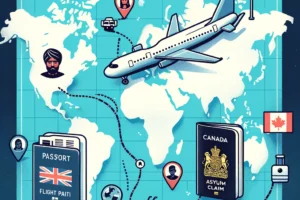Common Scams in Auto Transport Industry
Illegitimate Car Transport Companies

Car transporters are mandated to register with the Federal Motor Carrier Safety Administration, a government agency. To obtain this registration, they must meet specific minimum insurance coverage requirements. However, some businesses sidestep these regulations and operate illegally. Identifying these fly-by-night companies can be challenging for authorities, making it possible for you to encounter them. It’s crucial to steer clear of such auto transport companies. Fortunately, identifying them is relatively straightforward. Simply ask for their motor carrier number. Legitimate companies will readily provide it. Verify their legitimacy by cross-referencing the number on the FMCA’s website, which confirms their proper registration and insurance coverage.
Unidentified Drivers

Certain auto transport companies function as brokers rather than direct carriers. These brokers, instead of physically shipping your vehicle, act as intermediaries who subcontract the job to other companies. They profit by pocketing the difference between the amount you pay them and the cost they incur with the transporter.
While this arrangement isn’t inherently deceptive, the process of securing drivers for assignments can sometimes lead to scams. If a broker demands a deposit before disclosing the carrier company’s identity, it should raise a red flag. Many contracts stipulate that deposits are non-refundable if the job is canceled within a specified timeframe. Unscrupulous companies exploit this clause by initially offering a low price to entice customers, only to reveal after the cancellation period that no carrier is willing to accept such a minimal payment.
At this juncture, you’re faced with a dilemma: either pay an additional fee to proceed with the shipment or forfeit your deposit by canceling. Reputable companies refrain from employing such tactics. If a broker insists on an upfront deposit without divulging the carrier’s identity, it’s best to steer clear. This practice does not serve the consumer’s best interests.
Beware of Hidden Clauses in Contracts

While not explicitly a scam, encountering hidden clauses in a contract can certainly feel deceptive, especially if they work against you. Remember, a contract is a legally binding agreement, and by signing it, you are committing to all its terms, whether you’ve read them thoroughly or not. The only time a clause may not hold is if it’s deemed illegal, but challenging such clauses often requires legal action, which can be both costly and time-consuming.
Be cautious of clauses that disproportionately favor the company. For example, some contracts may include a clause that allows the company to retain your deposit even if they cancel the service close to the shipping date. Such clauses are prone to misuse, so it’s crucial to be vigilant.
However, this is just one example. Contracts can contain various clauses that may not be in your best interest, so it’s essential to read and understand them thoroughly before agreeing.
Concealing Transport Damage

This issue often arises at the completion of the transport job. It’s not uncommon for cars to sustain damage during transport, especially when maneuvering through the tight spaces required to load and unload them from trailers, leading to potential scrapes or dents.
A reputable transport company will take responsibility for any damage, as they should have insurance to cover such incidents. However, less scrupulous companies might attempt to prevent you from noticing the damage until it’s too late to hold them accountable. It’s crucial to inspect the car for damage at the time of delivery; discovering it even a few hours later may be considered too late for a claim. Dishonest companies may try to tip the scales in their favor by making it difficult for you to detect the damage.
Be wary if they propose delivering the car at night, as the darkness can easily conceal any damage. Similarly, if your car is dirty upon delivery, be cautious. Ideally, your car should have been clean when you handed it over to the carrier. If it’s covered in dirt, it might be an attempt to obscure any damage.
Beware of Hidden Add-On Fees

If you come across a company offering to ship your DeLorean to Guam for just $300, be cautious. While the price may seem attractive, it could be too good to be true. Lowball offers often indicate that there may be additional hidden costs that will surface after you’ve committed to the service. Ensure that all expenses, including taxes, fees, service charges, and any other potential charges, are fully disclosed and transparent before you agree to the service.
Strategies to Avoid Scams and Bad Business Deals

To safeguard yourself from scams or unfavorable business deals, consider the following steps:
- Thoroughly Read the Contract: Ensure you read every word of the contract. Even legitimate companies might include clauses that are not in your best interest. It’s challenging to avoid financial penalties if you’ve agreed to a contract that restricts cancellation.
- Check Online Reviews: Look for reviews from previous customers. While a few negative reviews might not be cause for alarm, a pattern of bad reviews, especially with accusations of scams, should raise red flags. If a company has a significant number of one-star reviews with scam allegations, it’s wise to steer clear.
- Consult the Better Business Bureau (BBB): Check the company’s profile on the BBB website. Numerous negative reviews or a low rating from the BBB are indicators that the company might not be trustworthy.
- Be Wary of Too-Good-to-Be-True Deals: If a deal seems excessively favorable, it’s likely not legitimate. For instance, transporting a car across the country for significantly less than $1,000 is unlikely with a reputable company, even when prices are generally low.
- Use a Credit Card for Payments: Always opt to pay with a credit card rather than a debit card or other payment methods. Credit cards offer legal protections that can facilitate the recovery of funds if you fall victim to a scam.
Steps to Take If You Suspect a Scam
Firstly, ensure that you have indeed been scammed. For example, if the driver is an hour late in delivering your car, it could be due to traffic congestion. Avoid making false accusations without clear evidence.
If you are certain of the scam, contact the transport company directly. If you used a broker, remember that the transport company might not be the same entity you initially booked with. This is why obtaining the driver’s contact information is crucial, as you may need to address any issues directly with them.

In cases where you have paid but not received the promised service, and the company is unresponsive, it’s time to contact your credit card issuer and request a chargeback. However, be sure that your claim is valid. For instance, if the contract includes a non-refundable cancellation fee, the credit card company may reverse the chargeback after investigating the matter. Be prepared for this process to take some time, although your credit card company might provisionally credit your account before the investigation concludes.







